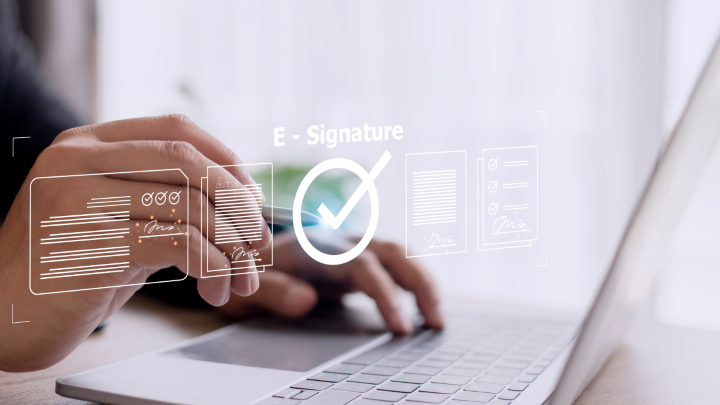
Do you even need to sign a contract?
A contract does not need to take any particular form, and case law confirms that electronic documents are generally capable of satisfying a statutory requirement for contracts to be in writing.
Parties can make most contracts informally, and the law does not require a contract to be signed (either electronically or otherwise) for it to be valid. A signature merely indicates the signer’s intention to authenticate the document. So, most contracts may be validly concluded with an electronic signature.
Electronic signatures
An electronic signature or e-signature is data in electronic form which the signatory uses to sign a document, including:
- typing a name or initials at the bottom of an email;
- clicking “I accept” on a website;
- using a stylus or finger to sign an electronic document via a touchscreen; or
- digital signatures.
Digital signatures
A digital signature is a technologically advanced and secure type of electronic signature.
There are two categories of digital signatures:
- Advanced electronic signature (AdES)
- Qualified electronic signature (QES)
A QES provides the highest level of admissibility in UK and EU courts and has the equivalent legal effect of a handwritten signature.
QES requires identity authentication before a digital certificate is issued. It offers the highest level of trust through face-to-face ID verification. DocuSign offers multiple QES with ID verification options.
E-signing platforms, such as DocuSign, typically utilise AdES, which creates an audit trail as part of the digital signing process. This trail records:
- who signed the document;
- their email and IP address;
- any additional steps taken to authenticate the signatory, such as a passcode sent to the signatory’s mobile phone; and
- a time stamp.
Does an electronic signature satisfy a statutory requirement for a contract to be made in writing or signed?
The Law Commission’s 2019 report: Electronic Execution of Documents, states that an electronic signature is capable in law of being used validly to execute a document (including a deed) subject to two important caveats:
- the person signing the document must have intended to authenticate it (that is, they plan to sign and be bound by it); and
- any formalities relating to the execution of that document must be satisfied.
If you sign a contract or deed with an electronic signature, but there is a contractual or statutory requirement for you to handwrite it (like in the case of wills), you will not execute the document validly.
Legal challenge and admissibility
The value of the contract or transaction and any jurisdictional considerations will help determine what lengths you should go to ensure the authenticity of a digital contract.
You should consider how trustworthy, secure and reliable the technology used to create the signature is. For example, a typed name at the end of a document is much easier to forge than a digital signature created by Adobe Sign.
If an opponent alleges that a digital contract is not authentic, they must prove their claim on the balance of probabilities. If the parties have used an e-signing platform, they will have a digital audit trail that would be substantial evidence of authenticity.
For digital contracts, the best practice is to use an e-signing platform wherever possible. It is also advisable to have a suitably drafted e-signing policy for your business so that all staff entering contracts do so correctly and in a way that reduces the scope for legal challenges in the future.
If you would like us to review your existing digital contracts or would like to implement an e-signing policy, get in touch with us today.
Note: This article is not legal advice; it provides information of general interest about current legal issues.
